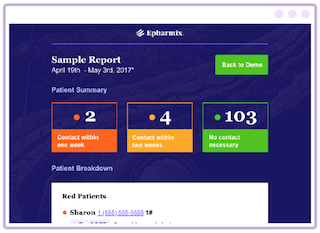 As the opioid epidemic continues to make its mark on the nation, healthcare professionals, innovators, and government officials are trying to come up with solutions. An article recently published in NEJM Catalyst suggests that using a texting system could help reduce opioid relapses, as well as keep costs down.
As the opioid epidemic continues to make its mark on the nation, healthcare professionals, innovators, and government officials are trying to come up with solutions. An article recently published in NEJM Catalyst suggests that using a texting system could help reduce opioid relapses, as well as keep costs down.
The article — which was coauthored by Epharmix's chief medical officer, a Preferred Family Healthcare employee, and a medical student — outlines the results of a small study where Preferred Family Healthcare patients recovering from opioid addiction used a texting system, called Epharmix, that was developed by researchers and alumni at Washington University in St. Louis. In the study, the number of participants reporting that they used opioids in the last three days fell from 43 percent to 12 percent after three months. However, it is important to note that fewer participants responded to the question at the end of the three-month period than the beginning.
Twenty-one patients were enrolled in the program. Patients and clinicians used the EpxSubstanceUse system by Epharmix, which is a automated SMS and phone call-based system.
“In light of the need for inexpensive, scalable solutions, we propose the widespread use of automated, bidirectional SMS- and phone call-based mobile health systems that seamlessly integrate into existing community substance abuse recovery programs,” the authors of the article wrote. “They will allow providers to expand their services to larger populations without putting additional strain on care managers.”
Typically clinicians prescribe the program to their patients, then the users answer texts on the phone and send clinically-relevant data. The system would then categorize at-risk users, which would in turn give an alert to the clinicians who could respond with appropriate follow up, such as a call.
Researchers found that more than 60 percent of users maintained text contact after three months. Users also reported that their relationship with their care manager improved over time.
Substance abuse reportedly went down among participants. When the study began, 42 percent reported using opioids within the last three days, 41 percent reported no use, and the rest did not respond. At the end of the first three months, 12 percent reported using in the last three days, 50 percent reported no use, and 38 percent didn’t reply to the messages.
The article reports that annual costs dropped by $173 dollars a year, translating to a 19 percent cost saving on each patient. This was attributed to a reduction in staff time spent monitoring each patient. The authors also noted that clinicians were able to see 23 percent more patients each week because of the time saved.
“Mobile health interventions have the potential to drive efficient expansion of services that combat the opioid crisis in the United States,” the authors of the article wrote. “While no amount of automated text messaging can substitute for human contact between patient and provider, mobile platforms can seamlessly connect patients to care managers, peer support groups, doctors, helplines, and other services more quickly and cost-effectively than can be achieved otherwise.”











